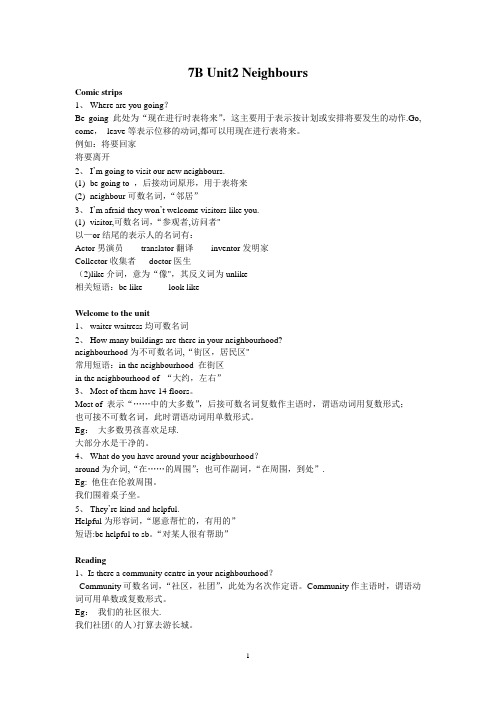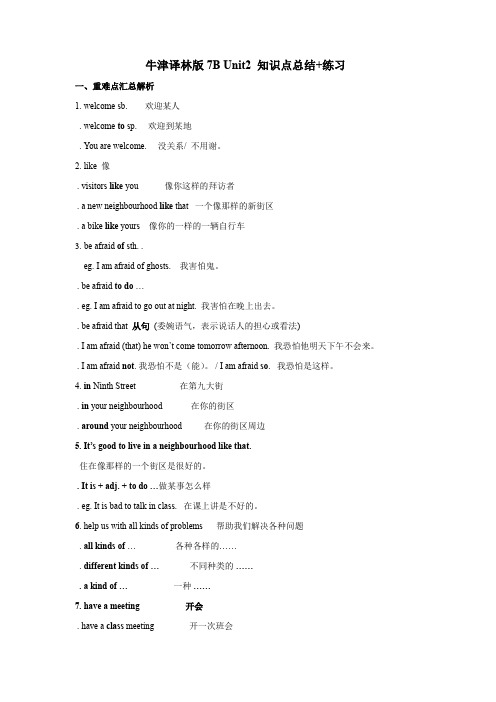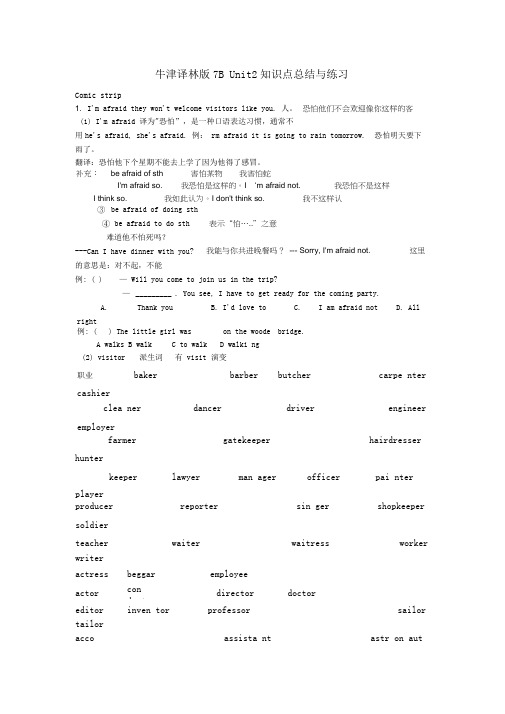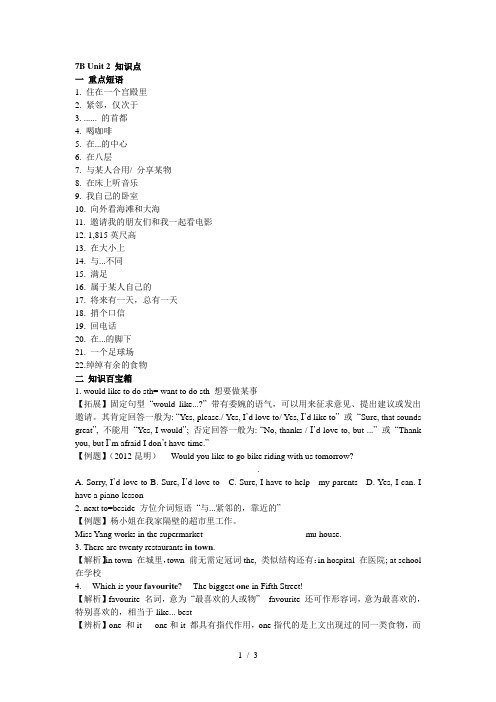牛津译林版7B-Unit2-知识点总结与练习
新7BU2知识点讲解(译林牛津版)

7B Unit2 NeighboursComic strips1、Where are you going?Be going 此处为“现在进行时表将来”,这主要用于表示按计划或安排将要发生的动作。
Go, come, leave等表示位移的动词,都可以用现在进行表将来。
例如:将要回家________________将要离开________________2、I’m going to visit our new neighbours.(1)be going to ,后接动词原形,用于表将来(2)neighbour可数名词,“邻居”3、I’m afraid they won’t welcome visitors like you.(1)visitor,可数名词,“参观者,访问者”以-or结尾的表示人的名词有:Actor男演员translator翻译inventor发明家Collector收集者doctor医生(2)like介词,意为“像”,其反义词为unlike相关短语:be like look likeWelcome to the unit1、waiter waitress均可数名词2、How many buildings are there in your neighbourhood?neighbourhood为不可数名词,“街区,居民区”常用短语:in the neighbourhood 在街区in the neighbourhood of “大约,左右”3、Most of them have 14 floors.Most of 表示“……中的大多数”,后接可数名词复数作主语时,谓语动词用复数形式;也可接不可数名词,此时谓语动词用单数形式。
Eg: 大多数男孩喜欢足球。
____________________________________________________大部分水是干净的。
____________________________________________________4、What do you have around your neighbourhood?around为介词,“在……的周围”;也可作副词,“在周围,到处”。
新7BU2知识点讲解(译林牛津版)

7B Unit2 NeighboursComic strips1、Where are you going?Be going 此处为“现在进行时表将来”,这主要用于表示按计划或安排将要发生的动作.Go, come,leave等表示位移的动词,都可以用现在进行表将来。
例如:将要回家________________将要离开________________2、I’m going to visit our new neighbours.(1)be going to ,后接动词原形,用于表将来(2)neighbour可数名词,“邻居”3、I’m afraid they won’t welcome visitors like you.(1)visitor,可数名词,“参观者,访问者"以—or结尾的表示人的名词有:Actor男演员translator翻译inventor发明家Collector收集者doctor医生(2)like介词,意为“像",其反义词为unlike相关短语:be like look likeWelcome to the unit1、waiter waitress均可数名词2、How many buildings are there in your neighbourhood?neighbourhood为不可数名词,“街区,居民区"常用短语:in the neighbourhood 在街区in the neighbourhood of “大约,左右”3、Most of them have 14 floors。
Most of 表示“……中的大多数”,后接可数名词复数作主语时,谓语动词用复数形式;也可接不可数名词,此时谓语动词用单数形式。
Eg:大多数男孩喜欢足球.____________________________________________________大部分水是干净的。
牛津译林7BUnit2知识点梳理

牛津译林7BUnit2知识点梳理牛津译林7B Unit 2知识点梳理Welcome1. meet sb. 和某人见面/见某人 . meet --- meeting n. have a (class/ parent s’) meeting 开班会/开家长会2. welcome sb. 欢迎某人. welcome to sp. 欢迎到某地. You are welcome. 没关系/ 不用谢。
3. like 像. visitors like you 像你这样的拜访者. a new neighbourhood like that 一个像那样的新街区. a bike like yours 像你的一样的一辆自行车4. be afraid of sth. . eg. I am afraid of ghosts. 我害怕鬼。
. be afraid to do…. eg. I am afraid to go out at night. 我害怕在晚上出去。
. be afraid that 从句(委婉语气,表示说话人的担心或看法) . I am afraid (that) he won’t come tomorrow afternoon.我恐怕他明天下午不会来。
. I am afraid not. 我恐怕不是(能)。
/ I am afraid so. 我恐怕是这样。
5. cook 厨师---- cooker 厨具. eg. a rice cooker 电饭煲6. Where do you live? \ Which place do you live in?你住在哪儿?Where are you going? \ Which place are you going to? 你要去哪儿?7. in Ninth Street 在第九大街. in your neighbourhood 在你的街区. around your neighbourhood 在你的街区周边8. one of them 其中之一. some of them 其中一些. most of them 其中大多数9. It’s good to live in a neighbourhood like that.住在像那样的一个街区是很好的。
牛津译林版7B Unit2 知识点复习总结+练习(无答案)

牛津译林版7B Unit2 知识点总结+练习一、重难点汇总解析1. welcome sb.欢迎某人.welcome to sp.欢迎到某地.You are welcome.没关系/ 不用谢。
2. like像. visitors like you像你这样的拜访者. a new neighbourhood like that一个像那样的新街区. a bike like yours像你的一样的一辆自行车3.be afraid of sth..eg. I am afraid of ghosts.我害怕鬼。
. be afraid to do…. eg. I am afraid to go out at night.我害怕在晚上出去。
. be afraid that 从句(委婉语气,表示说话人的担心或看法). I am afraid (that) he won’t come tomorrow afternoon.我恐怕他明天下午不会来。
. I am afraid not.我恐怕不是(能)。
/ I am afraid so.我恐怕是这样。
4.in Ninth Street在第九大街.in your neighbourhood在你的街区.around your neighbourhood在你的街区周边5. It’s good to live in a neighbourhood like that.住在像那样的一个街区是很好的。
. It is + adj. + to do…做某事怎么样. eg. It is bad to talk in class.在课上讲是不好的。
6. help us with all kinds of problems帮助我们解决各种问题.all kinds of…各种各样的…….different kinds of…不同种类的…….a kind of…一种……7. have a meeting开会. have a class meeting开一次班会. have a parents’meeting开一次家长会. have a sports meeting开一次运动会8. There is something wrong with my computer.我的电脑出了一些毛病。
牛津译林版7B-Unit2-知识点总结材料与练习

牛津译林版7B Unit2 知识点总结与练习Comic strip1. I'm afraid they won't welcome visitors like you. 恐怕他们不会欢迎像你这样的客人。
(1) I'm afraid 译为"恐怕”,是一种口语表达习惯,通常不用he's afraid, she's afraid.例:rm afraid it is going to rain tomorrow. 恐怕明天要下雨了。
翻译:恐怕他下个星期不能去上学了因为他得了感冒。
______________________________补充:be afraid of sth 害怕某物我害怕蛇rm afraid so. 我恐怕是这样的。
I ‘ m afraid not. 我恐怕不是这样的。
I think so. 我如此认为。
I don't think so. 我不这样认为。
③ be afraid of doing sth④be afraid to do sth 表示"怕…..”之意难道他不怕死吗?---Ca n I have dinner with you? 我能与你共进晚餐吗?--- Sorry, I'm afraid not. 这里的意思是:对不起,不能例: ( ) —Will you come to join us in the trip?— __________ . You see, I have to get ready for the coming party.A. Tha nk youB. I'd love toC. I am afraid notD. All right例: ( ) The little girl was afraid ____ on the wooden bridge.A walksB walkC to walkD walk ing(2) visitor 派生词有visit演变职业baker barber butcher carpe nter cashierclea ner dancer driver engin eer employerfarmer gatekeeper hairdresser hun terkeeper lawyer man ager officer pain ter playerproducer reporter sin ger shopkeeper soldierteacher waiter waitress worker writeractress beggar employeeactor con ductor director doctor editor inven tor professor sailor tailoracco untant assista nt astr on aut serva ntartist den tist host pilot priest scie ntist typistbus in essma n fishma n spacema n policema n postma n seama ncapta in model DJ cooknurseclerk(3) like 介词 像与…一样 like 与as 的区别动词喜欢做某事2. Most of them have 14 floors. 大多数楼有 14 层。
牛津译林版7B-Unit2-知识点总结与练习

牛津译林版7B Unit2知识点总结与练习Comic strip1. I'm afraid they won't welcome visitors like you. 人。
(1) I'm afraid 译为"恐怕”,是一种口语表达习惯,通常不用he's afraid, she's afraid. 例: rm afraid it is going to rain tomorrow. 恐怕明天要下雨了。
翻译:恐怕他下个星期不能去上学了因为他得了感冒。
③ be afraid of doing sth ④ be afraid to do sth 难道他不怕死吗?---Can I have dinner with you? 的意思是:对不起,不能 例: ( )— Will you come to join us in the trip?— _________ . You see, I have to get ready for the coming party. A.Thank youB. I'd love toC. I am afraid notD. Allright例: ( ) The little girl was afraid on the woode n bridge.A walksB walkC to walkD walki ng(2) visitor 派生词 有 visit 演变职业bakerbarberbutchercarpe nter cashierclea ner dancerdriverengineer employerfarmergatekeeperhairdresserhunterkeeperlawyerman agerofficerpai nter playerproducerreportersin gershopkeepersoldierteacherwaiterwaitressworkerwriteractress beggar employeeactor con ductor director doctoreditor inven torprofessorsailortailoraccoassista ntastr on aut恐怕他们不会欢迎像你这样的客 补充: be afraid of sth 害怕某物 我害怕蛇I think so.我如此认为。
牛津译林版7B-Unit2-知识点总结与练习汇编

牛津译林版7B Unit2 知识点总结与练习Comic strip1.I'm afraid they won't welcome visitors like you. 恐怕他们不会欢迎像你这样的客人。
(1)I'm afraid 译为“恐怕”,是一种口语表达习惯,通常不用he's afraid, she's afraid. 例:I'm afraid it is going to rain tomorrow. 恐怕明天要下雨了。
翻译:恐怕他下个星期不能去上学了因为他得了感冒。
补充:①be afraid of sth 害怕某物我害怕蛇②I'm afraid so. 我恐怕是这样的。
I‘m afraid not. 我恐怕不是这样的。
I think so. 我如此认为。
I don't think so. 我不这样认为。
③ be afraid of doing sth④ be afraid to do sth 表示“怕….. ”之意难道他不怕死吗?---Can I have dinner with you?我能与你共进晚餐吗?--- Sorry, I'm afraid not.这里的意思是:对不起,不能例:( ) —Will you come to join us in the trip?— . You see, I have to get ready for the coming party.A. Thank youB. I'd love toC. I am afraid notD. All right 例:()The little girl was afraid _____ on the wooden bridge.A walksB walkC to walkD walking(2)visitor 派生词有visit演变职业baker barber butcher carpenter cashier cleaner dancer driver engineer employerfarmer gatekeeper hairdresser hunterkeeper lawyer manager officer painter player producer reporter singer shopkeeper soldier teacher waiter waitress worker writer actress beggar employeeactor conductor director doctor editor inventor professor sailor tailor accountant assistant astronaut servant artist dentist host pilot priest scientist typist businessman fishman spaceman policeman postman seaman captain model DJ judgecook nurse clerk secretary(3)like介词像与…一样like 与as 的区别动词喜欢做某事2.Most of them have 14 floors.大多数楼有14层。
牛津译林新版7B-Unit-2-知识点

7B Unit 2 知识点一重点短语1. 住在一个宫殿里___________________2. 紧邻,仅次于___________________3. ...... 的首都_________________4. 喝咖啡____________________5. 在...的中心_________________6. 在八层____________________7. 与某人合用/ 分享某物_______________8. 在床上听音乐_____________________-9. 我自己的卧室_________________10. 向外看海滩和大海_______________11. 邀请我的朋友们和我一起看电影_________________________________________12. 1,815英尺高________________________13. 在大小上_____________________14. 与...不同______________________-15. 满足____________________________16. 属于某人自己的_________________________17. 将来有一天,总有一天___________________--18. 捎个口信_______________________19. 回电话__________________________20. 在...的脚下________________________21. 一个足球场_________________________22.绰绰有余的食物_______________________二知识百宝箱1. would like to do sth= want to do sth 想要做某事【拓展】固定句型“would like...?”带有委婉的语气,可以用来征求意见、提出建议或发出邀请。
- 1、下载文档前请自行甄别文档内容的完整性,平台不提供额外的编辑、内容补充、找答案等附加服务。
- 2、"仅部分预览"的文档,不可在线预览部分如存在完整性等问题,可反馈申请退款(可完整预览的文档不适用该条件!)。
- 3、如文档侵犯您的权益,请联系客服反馈,我们会尽快为您处理(人工客服工作时间:9:00-18:30)。
牛津译林版7B Unit2 知识点总结与练习Comic strip1.I'm afraid they won't welcome visitors like you. 恐怕他们不会欢迎像你这样的客人。
(1)I'm afraid 译为“恐怕”,是一种口语表达习惯,通常不用he's afraid, she's afraid. 例:I'm afraid it is going to rain tomorrow. 恐怕明天要下雨了。
翻译:恐怕他下个星期不能去上学了因为他得了感冒。
补充:①be afraid of sth 害怕某物我害怕蛇②I'm afraid so. 我恐怕是这样的。
I‘m afraid not. 我恐怕不是这样的。
I think so. 我如此认为。
I don't think so. 我不这样认为。
③ be afraid of doing sth④ be afraid to do sth 表示“怕….. ”之意难道他不怕死吗?---Can I have dinner with you?我能吗?--- Sorry, I'm afraid not.这里的意思是:对不起,不能例:( ) —Will you come to join us in the trip?— . You see, I have to get ready for the coming party.A. Thank youB. I'd love toC. I am afraid notD. All right 例:()The little girl was afraid _____ on the wooden bridge.A walksB walkC to walkD walking(2)visitor 派生词有visit演变职业baker barber butcher carpenter cashier cleaner dancer driver engineer employerfarmer gatekeeper hairdresser hunterkeeper lawyer manager officer painter player producer reporter singer shopkeeper soldier teacher waiter waitress worker writer actress beggar employeeactor conductor director doctor editor inventor professor sailor tailor accountant assistant astronaut servant artist dentist host pilot priest scientist typist businessman fishman spaceman policeman postman seaman captain model DJ judgecook nurse clerk secretary(3)like介词像与…一样like 与as 的区别动词喜欢做某事2.Most of them have 14 floors.大多数楼有14层。
most的用法①表示“数量上最多,最大”,为many或much 的最高级。
例:She had the most money of all of them.在这些人中,她最有钱。
② most of + the/this/these/that/those/物主代词+名词,指某一范围内的多数。
(名词前面一定要有修饰词)例:Most of the students come from China. most of my books③ most of +可数名词复数+ V复most of +不可数名词+V单④most 与most of 的区别1 most+名词表泛指,无范围如:most young peopleII most of + 名词指某一范围的多数III most of +人称代词,of 不能少如:most of them两者有时可互换:Most teachers in this school are women.= Most of the teachers in this school are women.翻译:那里大多数的医生来自中国。
大部分水是干净的。
3 It’s good to live in a neighbourhood like that. 住在那样的居民区里真好。
It+ be+ 形容词+ to do sth 是英语中常见的一个句式,是“做某事是……的”。
表示对某人来说做某事是…..的:如果形容词说明人的品质、性格特征,则用:翻译:弹钢琴很容易。
对我们来说,保护我们的地球是重要的。
帮助那位老人你真善良。
练习1. People who live next to each other are n_________________ .2. Do you want to become a doctor l______________ him ?3. Wow , how tall the new ___________________ (build) are!4. Every year many v________________ come to London to see Big Ben.5. Would you like ______________________( anything) to eat , please?6. The two beautiful sweaters are for the __________________( twin ).7. There are many different ______________________ ( 访客) in this place.8. Palace is my _________________________ ( 最喜欢的) .9. One of _____________________(wait) is his cousin.10. Stephen likes sports very much, like _____________(play) football, basketball and so on.1. Welcome ____________ (visit) our city!2. There ____________ (not be ) any interesting news in today’ s newspaper.3. Would your mother like _________________ ( wash ) the dishes after dinner?4. Huang Lei is good at ___________ ( check ) cars.5. When and where _________ they _________ (meet) their friends?6. Tom , _____________________ ( not be ) late for school again.7. Let’s ____________ (go) to the zoo by bike!8. Amy ___________ ( not teach ) us computer games.Reading1.They are kind and helpful. 他们友好而且乐于助人。
①helpful (adj.) 乐于助人,有帮助的help---helpful care---careful如:琳达经常帮助我,她是一位乐于助人的女孩。
②kind用法2.There's something wrong with my computer. 我的电脑坏了。
◎there's something wrong with sth =sth is not working well=sth is broken 意为“某物失灵”◎something ---复合不定代词,类似有anything,nothing,everything, somebody, nobody, everybody 等。
Something多用于肯定句中,否定句或疑问句中常用anything 做主语时谓语动词用单数形式。
◎形容词,动词不定式,else 等词修饰不定代词时,要后置如:nothing interesting 没什么有趣的anything else 其他任何东西There's nothing new in today's newspaper.3. I'm going to ask a computer engineer to check it. 我打算叫一个电脑工程是来检查一下。
◎ask sb to do sth 要求/请求某人做某事ask sb not to do sth 要求/请求某人不做某事◎ask (sb) for help (向某人)请求帮助例:You can ask 110 for help when you have trouble. ◎ask (sb) for sth (向某人)要求得到某物例:Don't ask your parents too much money to buy snacks.◎ask sb about sth 询问某人关于某事例:She asks me some questions about animals.4.My cousin Annie's bicycle is broken, so she's going to ask someone to fix it.◎broken 形容词“坏的,破的,折了,断了”例:The glass is broken, who broke it?玻璃坏了,谁弄碎的?◎break---broke---broken 打破,打断,,弄坏例:Don't break the eggs, they are for you. ◎fix5. Some college students are ready to help. 一些大学生很乐于帮忙。
①college students 大学生②go to college 上大学③be ready to do sth 乐意/准备干某事=be willing to do sth例:One of my classmates is always ready to help other students. 我的一个同班同学一直很乐于帮助其他同学。
